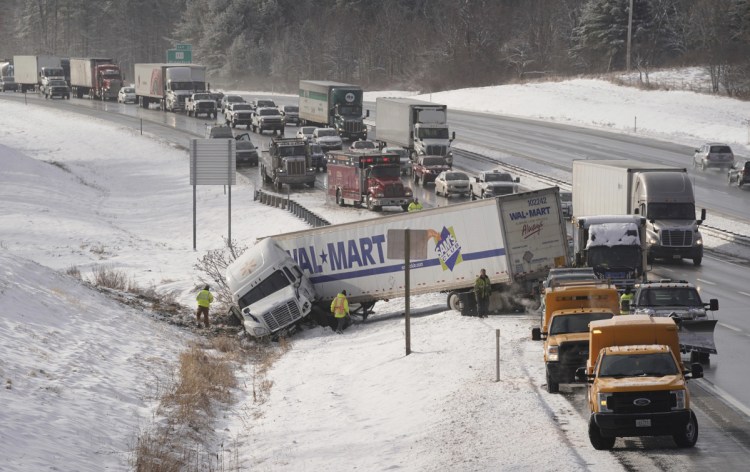BATH — Tractor-trailers: We can’t live with them and we can’t live without them. We’ve all dealt with them out on the roads – especially on Interstate 295, but also locally on Route 1. We know that our economy is dependent on these trucks for quick and efficient shipping of goods, but a handful of major players in the industry are pushing a new initiative that takes things too far – they are asking Congress to pass new rules allowing much heavier single-trailer trucks and even longer trailers on their double-trailer trucks.
The real-world safety ramifications of these big trucks hit pretty close to home a couple of months ago. In November, Lt. Brian Quinn of the Sagadahoc County Sheriff’s Office was conducting a routine traffic stop on I-295 in Gardiner when his patrol car was struck by a twin-trailer truck. Luckily, his injuries weren’t life-threatening, and he is recovering well. However, this led me to think about how even bigger trucks would certainly turn incidents like this from bad to fatal. The impact of a crash is the velocity multiplied by the weight, so bigger trucks would almost certainly lead to more fatalities on our roads.
These incidents are by no means limited to the interstates. Right before Christmas, a motorist was seriously injured on Route 1 in Woolwich in an accident involving a tractor-trailer. The wreck resulted in Route 1 being completely closed for several hours. Allowing bigger commercial trucks to mix with our much smaller and lighter personal vehicles can cause real safety concerns. There were 808 large-truck crashes in Maine in 2017, according to the Federal Motor Carrier Safety Administration, a total that is 7 percent higher than the previous year – a disturbing trend.
As sheriff, it’s my job to help ensure that our residents and our officers are as safe as possible while traveling on our city streets. To that end, I have been consistent in opposing any legislation that would put heavier or longer trucks into our traffic mix. This is in lockstep with the Maine Sheriffs’ Association, as well as the National Sheriffs’ Association. It’s important to keep in mind that this would affect the entire country, as all states would have to comply with any changes in federal regulations allowing bigger trucks.
I’m reaching out on this issue because it has affected our department personally, as it has so many law enforcement departments across the nation. Bigger trucks are yet another added danger that men and women in uniform don’t need to be saddled with. I think that the public should be aware that this push for bigger trucks is happening again in this Congress, and I hope they will join me in reaching out to their elected officials and asking that they oppose these increases. The cost savings to a few huge shipping companies is just not worth the cost these bigger trucks would exact on our driving safety.
I keep thinking over and over again what might have happened to Lt. Quinn had that truck had trailers that weighed another 11,000 pounds or were 5 feet longer, as lobbyists are proposing in Washington. We would all do well to keep this in mind when we are out on the road.
Send questions/comments to the editors.



Success. Please wait for the page to reload. If the page does not reload within 5 seconds, please refresh the page.
Enter your email and password to access comments.
Hi, to comment on stories you must . This profile is in addition to your subscription and website login.
Already have a commenting profile? .
Invalid username/password.
Please check your email to confirm and complete your registration.
Only subscribers are eligible to post comments. Please subscribe or login first for digital access. Here’s why.
Use the form below to reset your password. When you've submitted your account email, we will send an email with a reset code.